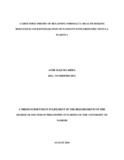| dc.description.abstract | Background: Obstetric fistula is a reproductive health problem causing immense suffering to 1% of women in Kenya. Formed as sequelae to obstructed labour, the women endure urinary and faecal incontinence, foot drop, social isolation, stigma, and psychological symptoms and endure great disruption to their socioeconomic wellbeing. Approximately 1200 women undergo free surgery annually.
Objective: The health behaviour of fistula patients and their penultimate reintegration after surgery remains undocumented. The purpose of this study was to explore the experiences of women seeking treatment during fistula illness and their return to normalcy after surgery in three VVF repair centres in Kenya. The study sought to answer three main research questions. 1) What key patterns of health seeking behaviour do women with obstetric fistula display in their quest for healing? 2) How do obstetric fistula patients cope with the illness? 3) What are the strategies that improve obstetric fistula patients’ social reintegration?
Methods: Qualitative research methods were used to conduct the study. Grounded theory methodology was used to examine the health seeking trajectories of patients with obstetric fistula. Qualitative data was obtained through narratives with women after corrective surgery in two phases. In-depth interviews with family members and health care providers were also conducted. Initially, 121 interviews participants were conducted in the immediate period after surgery. In the second phase, interviews with 61 participants were conducted during community follow-up visits in their homes after 6-19 months postoperatively. Grounded theory processes of theoretical sampling, repeated measurement; constant comparative coding in three stage open, axial and selective coding; memoing, reflexivity and positionality were applied. The study was conducted over a 19 month period at a cost of Ksh. 1,340,115.
xiii
Results: Based on phase one results, an argument is made that the chronicity of fistula illness is presented in the narratives of women who live with the illness for years to decades, presenting physical, hygiene and moral challenges. Fistula illness introduces a crisis in women’s life begetting feelings of shame. To regain normalcy, women respond by reaching out to family and the formal health care system. A composite pathway of health seeking behaviour generated is sequential, composed of seven key actors, with hospitals as key dispersers of women to alternative care providers. Health system failures are a key contributor to this pathway besides women’s individual factors such as knowledge about fistula illness and contextual situations such as support of family and peers.
Based on phase two findings, an argument is made that after surgery, four possible outcomes of reintegration are presented, namely reintegration fully or partially back into their previous communities, not reintegrated or newly integrating away from previous social and family settings. These four possible outcomes are a result of interaction between enablers and disablers of the process of regaining normalcy, depending on the woman’s individual and contextual factors. The results were used to develop a conceptual framework of reintegration of fistula patients and generate theory. The emerging substantive grounded theory on regaining normalcy for fistula patients is presented.
Conclusion: Grounded theory techniques were sufficient to investigate the processes of health seeking behaviour and the process of reintegration for obstetric fistula patients. In their quest for healing, obstetric fistula patients experience dysfunctional health seeking behaviour patterns. Further, their return to a normal life depends on eliminating disablers and strengthening the enablers of reintegration. The study recommends holistic programs delivering care to fistula
xiv
patients to hasten the treatment of existing cases and ensure return to normal lives to all patients treated using the conceptual framework of regaining normalcy for fistula patients. | en_US |
| dc.description.department | a
Department of Psychiatry, University of Nairobi, ; bDepartment of Mental Health, School of Medicine,
Moi University, Eldoret, Kenya | |



